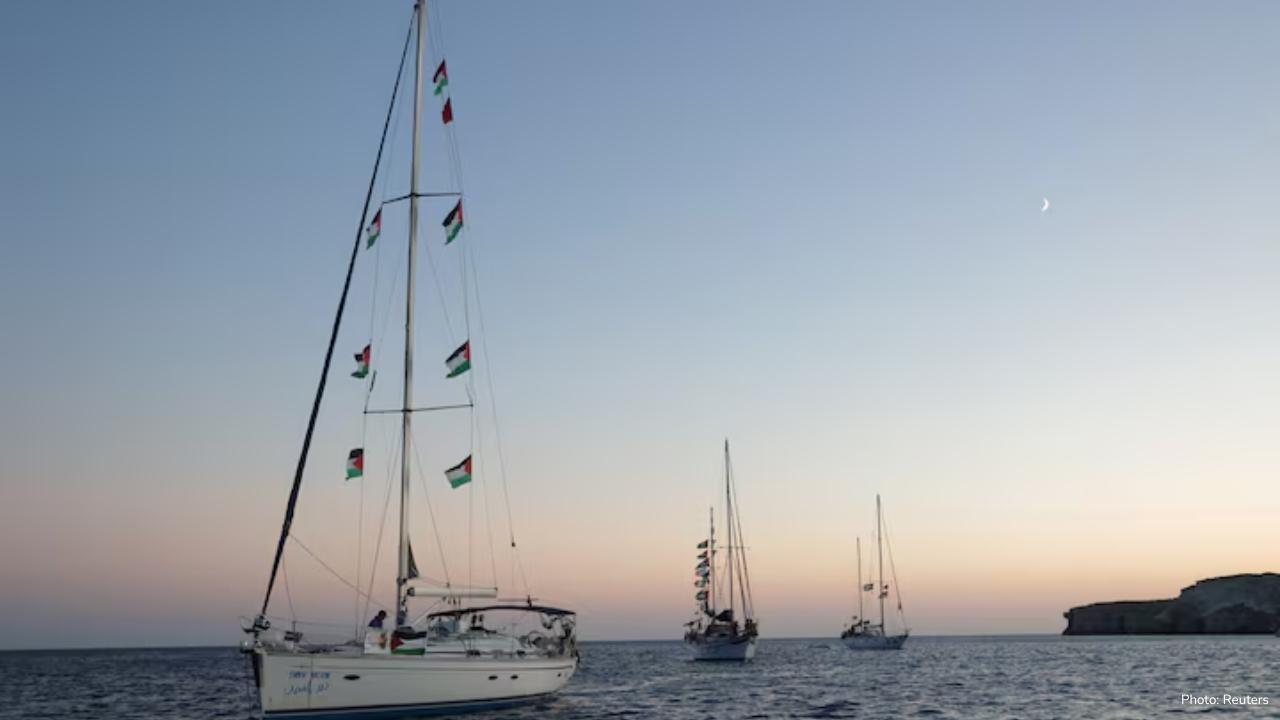
Post by : Monika
On October 1, 2025, the Global Sumud Flotilla, an international group of civilian boats carrying humanitarian aid to Gaza, reported an encounter with several unidentified vessels. Some of these vessels were navigating without lights, which raised concerns for the safety of the flotilla participants. The incident prompted the flotilla to implement heightened security measures. Although the vessels eventually moved away, the episode highlighted the ongoing challenges and risks faced by aid missions to Gaza.
The Mission of the Flotilla
The Global Sumud Flotilla consists of more than 40 boats carrying over 500 activists from different countries. Among the participants are parliamentarians, lawyers, and well-known figures such as Swedish climate activist Greta Thunberg. The flotilla’s main goal is to deliver humanitarian aid to Gaza and challenge Israel’s maritime blockade, which restricts the movement of goods and people in and out of the region.
The flotilla’s organizers emphasize that the mission is entirely peaceful. The aid onboard includes food, medical supplies, and other essential items needed by the residents of Gaza, who have been severely affected by years of conflict and blockades. Supporters see the flotilla as a symbol of international solidarity with the people of Gaza, while critics worry about the potential for political tension and confrontations at sea.
Previous Security Challenges
This is not the first security incident encountered by the flotilla. Earlier during the journey, the convoy was attacked by drones that dropped stun grenades and substances like itching powder. While no serious injuries were reported, the attacks caused some damage and raised concerns about the flotilla’s ability to continue safely. These incidents took place in international waters near Greece, illustrating that the flotilla operates in an area where tensions are high and risks are ever-present.
The recent encounter with unlit vessels is part of a pattern of increasing threats. The participants have had to prepare for possible interceptions and navigate carefully to avoid confrontations with unknown ships. Organizers have stressed that the flotilla remains committed to its humanitarian goals and will continue its mission despite these challenges.
Italy’s Role and Withdrawal
Italy initially offered naval support to the flotilla by deploying military ships to accompany and protect the civilian boats. However, Italy announced that it would stop providing naval assistance once the flotilla reaches within 150 nautical miles of Gaza. The decision was made due to concerns about potential confrontations with Israeli forces, who have consistently opposed the flotilla’s mission.
Italy suggested an alternative plan where the aid could be delivered via Cyprus, allowing for safer transfer to Gaza. However, the flotilla organizers rejected this option, insisting on delivering the aid directly to Gaza. This decision reflects the determination of the participants to maintain the direct humanitarian link with the people of Gaza, even at the risk of political and security complications.
Greece Ensures Safe Passage
In contrast to Italy’s withdrawal of naval support, Greece has pledged to help the flotilla navigate safely through its waters. Greek Foreign Minister Giorgos Gerapetritis stated that Greece has informed Israel about the presence of Greek citizens on board the flotilla and expressed the country’s commitment to protecting the participants.
While Greece has not deployed military forces to escort the flotilla, its monitoring and diplomatic assurances are intended to reduce the risk of incidents in Greek territorial waters. This support underscores the importance of international cooperation and the role of neighboring countries in ensuring the safety of humanitarian missions.
Turkish Drone Surveillance
The flotilla has been monitored by military drones launched from Turkey’s Corlu airbase. These drones have been circling the flotilla for several days, keeping track of the movement of the boats. The presence of drones adds another layer of complexity to the flotilla’s journey. While surveillance can help prevent accidents, it also raises concerns among participants about potential interference or escalation.
The flotilla’s organizers have been in constant communication with authorities and international observers to ensure that their operations comply with maritime laws and international safety standards. Despite the presence of drones, the flotilla remains focused on its mission to deliver aid and avoid any escalation.
Israel’s Position
Israel has long opposed flotillas attempting to breach the maritime blockade of Gaza. Israeli officials argue that the blockade is necessary for security reasons, including preventing the smuggling of weapons into the region. The Israeli government has declared that it will prevent unauthorized vessels from reaching Gaza’s waters.
Although Israel has not commented specifically on the recent encounter with unlit vessels, it continues to assert that any flotilla approaching Gaza will be monitored closely. In previous flotilla attempts, Israeli forces have intercepted ships to enforce the blockade, sometimes resulting in international criticism and political debates.
Humanitarian Focus of the Flotilla
The main purpose of the flotilla is humanitarian. The residents of Gaza have endured years of hardship, including limited access to food, clean water, electricity, and medical care. The Global Sumud Flotilla aims to provide relief to those suffering from these conditions while drawing international attention to the ongoing crisis.
Participants emphasize that the mission is peaceful and non-political. By delivering aid directly, they hope to highlight the challenges faced by ordinary people in Gaza and encourage broader international action to address the humanitarian situation. The flotilla also seeks to raise awareness about the effects of blockades and conflicts on civilians.
Security Measures and Preparedness
Following the encounter with unlit vessels, the flotilla implemented additional security measures. Crew members increased vigilance, ensured that communications systems were active, and coordinated movements to maintain safe distances from unidentified ships. The flotilla also consulted with maritime experts and international observers to assess potential risks and develop contingency plans.
Organizers stress that while the flotilla seeks to avoid confrontation, they are prepared to respond to emergencies. Safety of the crew and aid materials remains the top priority, and every effort is made to ensure compliance with international maritime laws.
International Attention
The flotilla has attracted attention from media, governments, and humanitarian organizations worldwide. Supporters view the mission as a courageous act of solidarity with the people of Gaza, while critics argue that it could provoke unnecessary political tension. The encounter with unlit vessels has intensified this attention, highlighting the delicate balance between humanitarian missions and security considerations in conflict zones.
International observers emphasize that missions like this must be carefully managed to prevent escalation. Humanitarian aid should reach those in need without becoming entangled in political conflicts or military confrontations. The Global Sumud Flotilla is seen as a test of how civilian missions can operate safely in areas of heightened tension.
Looking Ahead
The situation remains fluid as the flotilla continues its journey. Participants remain committed to delivering aid to Gaza and are closely monitoring developments. The next few days will be crucial in determining whether the flotilla can reach its destination safely.
The flotilla’s experience also serves as a case study for other humanitarian missions operating in politically sensitive and high-risk areas. Lessons learned from this journey may inform future strategies for ensuring the safe delivery of aid while maintaining a peaceful approach.
The encounter with unlit vessels is a reminder of the risks and complexities involved in humanitarian missions to Gaza. Despite these challenges, the Global Sumud Flotilla remains determined to deliver aid directly to those in need. The mission highlights the courage of civilians and activists who work in difficult and dangerous conditions to support people affected by conflict.
The support from countries like Greece, the monitoring from Turkey, and the careful planning by the flotilla organizers all contribute to the safety and effectiveness of the mission. While political tensions and security threats remain, the flotilla continues to focus on its humanitarian goals, striving to provide relief and bring international attention to the ongoing crisis in Gaza.
The journey of the Global Sumud Flotilla demonstrates that even in areas of conflict, humanitarian efforts can persist with careful planning, international cooperation, and commitment to the principles of peace and assistance. The flotilla’s mission is both a practical effort to deliver aid and a symbolic statement of solidarity with the people of Gaza.
Gaza Flotilla Humanitarian aid


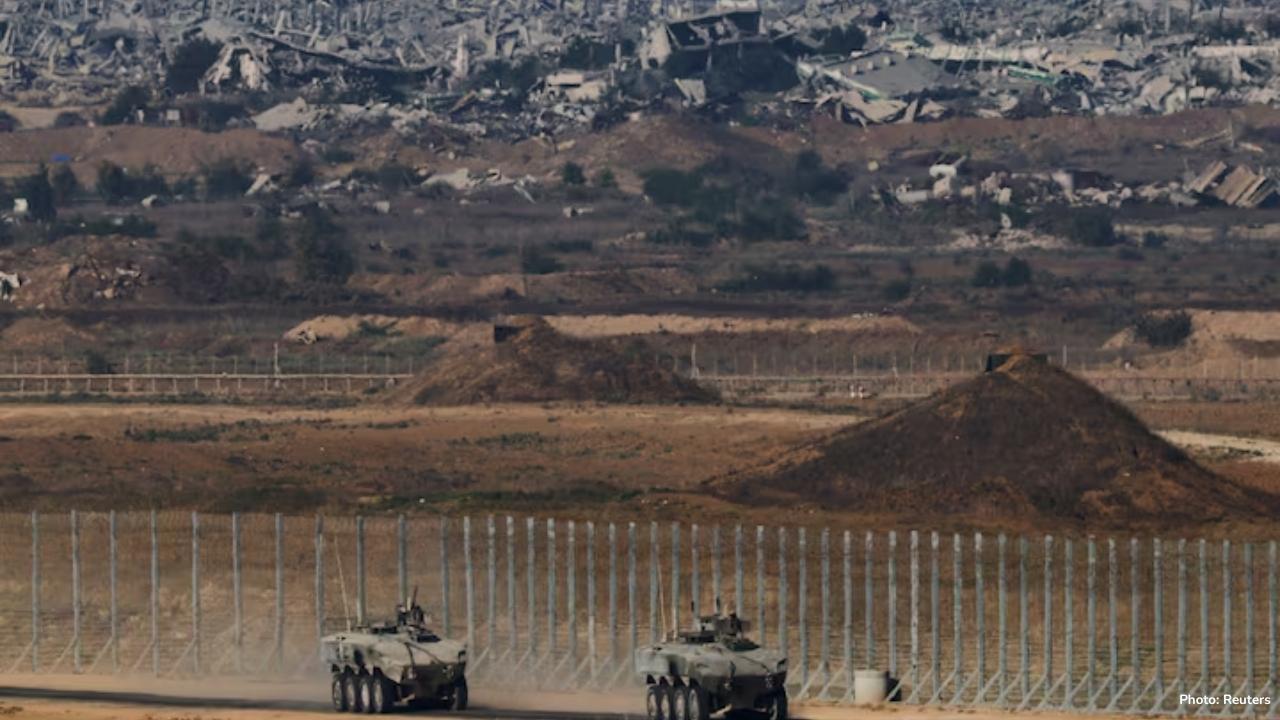
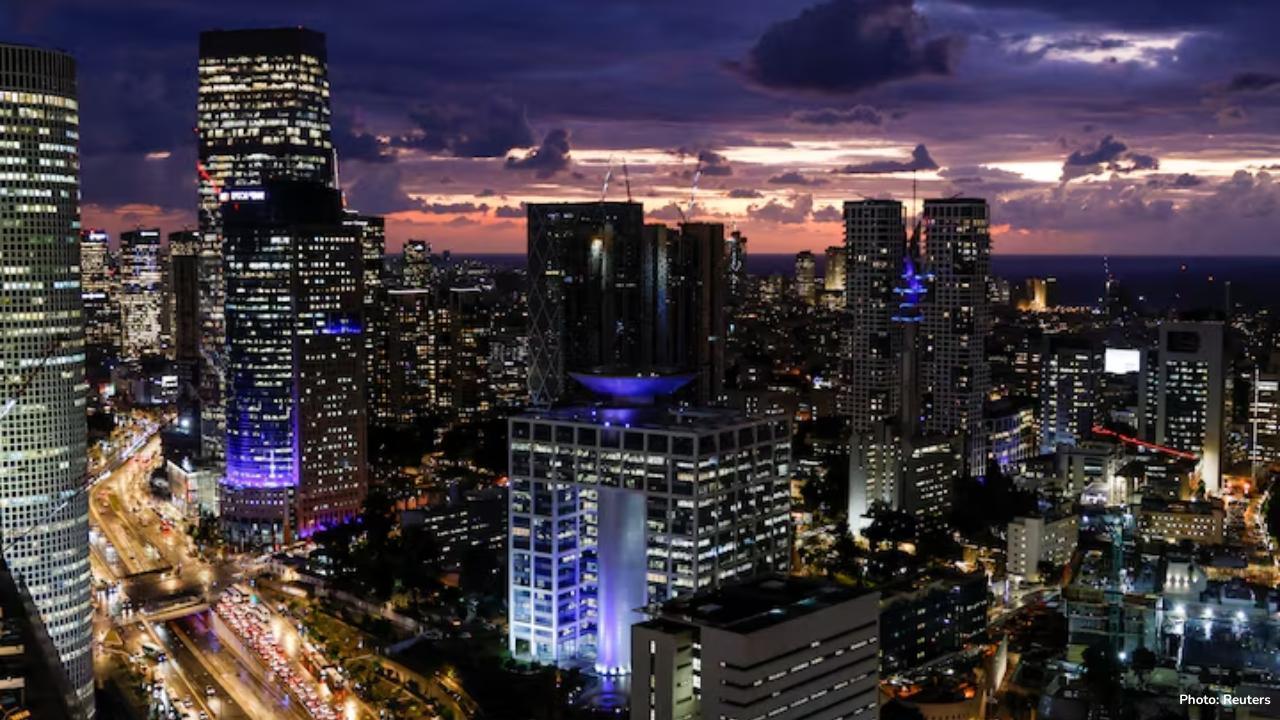
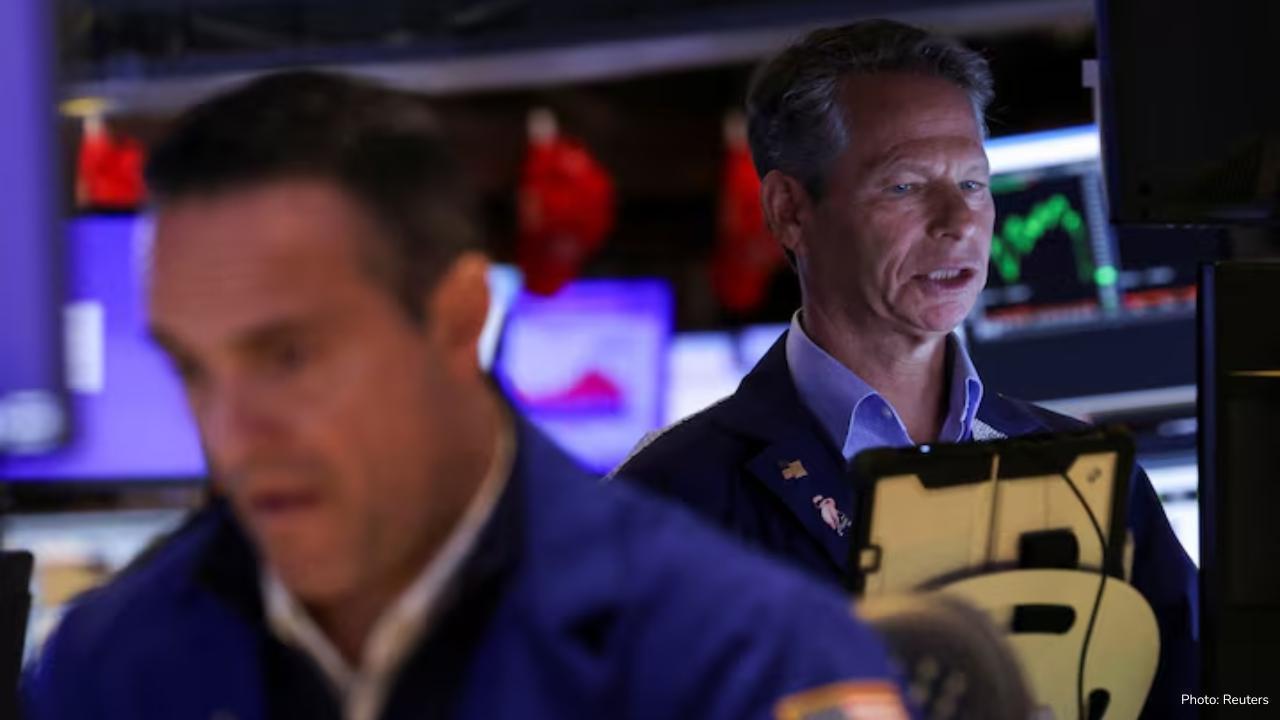


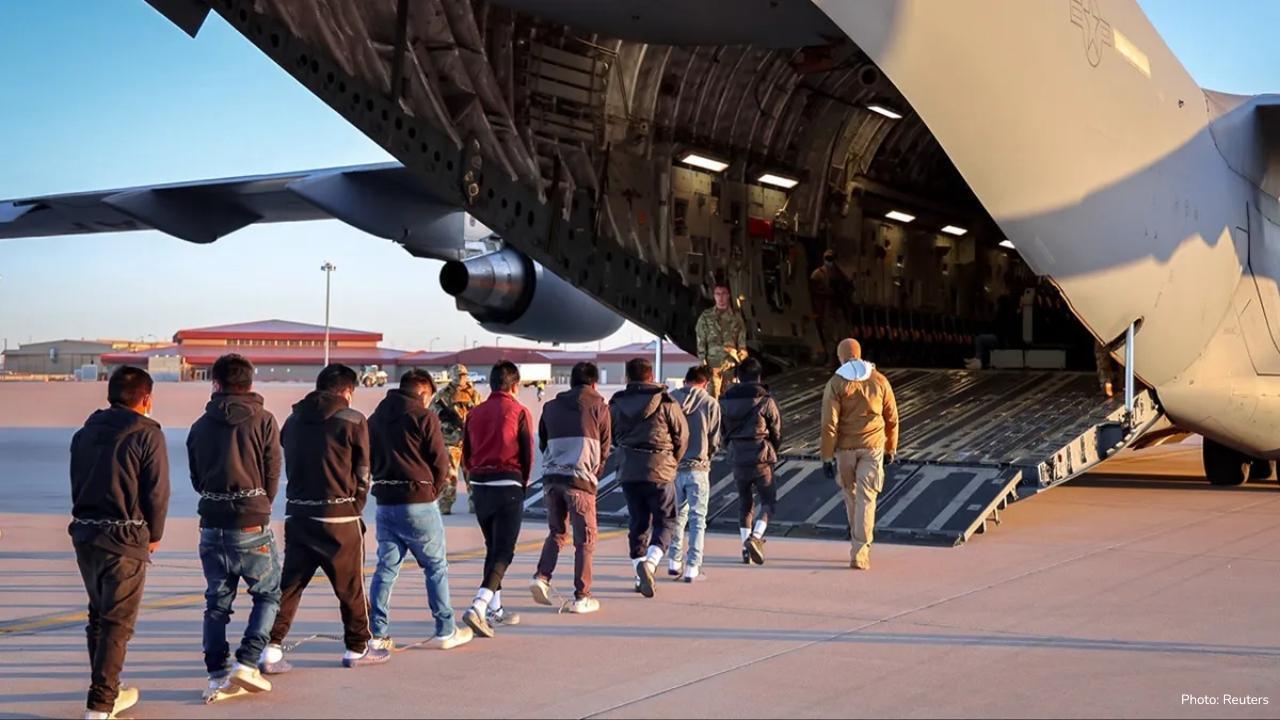
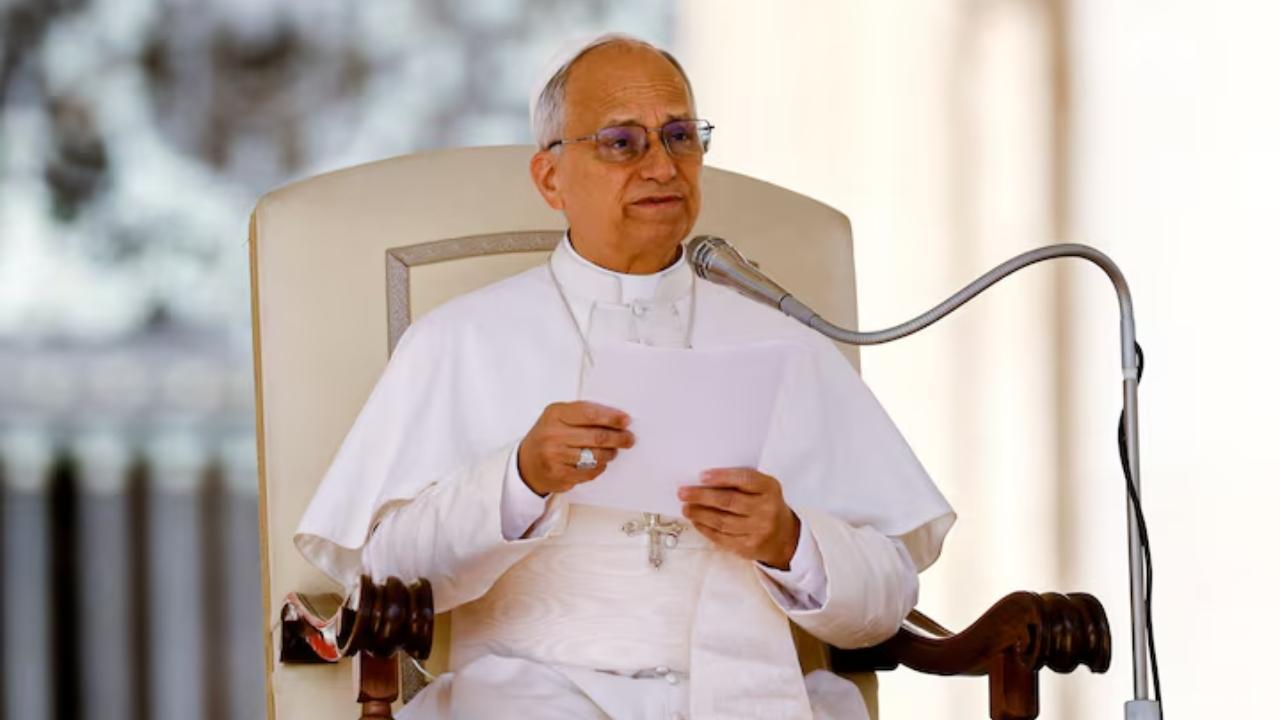

Bollywood Stars Sue Google Over AI Videos Misusing Their Image
Bollywood actors Abhishek Bachchan and Aishwarya Rai Bachchan have filed a lawsuit against Google, s

India's Central Bank Keeps Interest Rate Unchanged at 5.50%
India's Reserve Bank holds repo rate at 5.50%, indicating potential rate cut in December amid low in

Trump's Gaza Peace Plan: Ceasefire, Hostage Exchange, and Future Governance
President Trump's 20-point plan aims to end the Gaza conflict with ceasefire, hostage exchange, and

Israeli Tech Sector Grows Amid Gaza Conflict
Despite the ongoing Gaza war, Israel's high-tech industry thrives in 2025, with increased funding an

Global Markets React to China's Economic Slowdown and Policy Changes
Global markets face uncertainty as China's economic slowdown and policy changes impact investor conf

Gaza Aid Flotilla Faces Unidentified Vessels, Enhances Security
Global Sumud Flotilla reports unlit boats approaching, prompting increased safety measures as they d